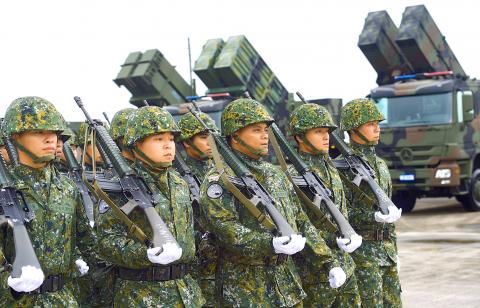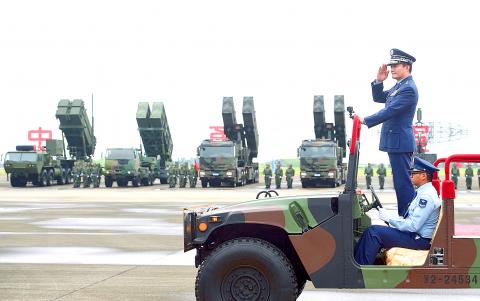The air force yesterday established the Republic of China (ROC) Air Force Air Defense and Missile Command to better coordinate air defense operations.
Speaking at the formal establishment of the command at Tainan Air Force Base, Air Force Commander General Shen Yi-ming (沈一鳴) said the new command, which combines the Air Defense Artillery and Air Defense Missile commands, will allow the air force to better coordinate air defense command and control.
The new command, led by former air force command chief of staff Fan Ta-wei (范大維), eliminates overlap between different commands within the air force, thereby enhancing operational efficiency, Shen said.

Photo: Peter Lo, Taipei Times
The new command has also shuffled personnel from the original two commands to establish five air defense brigades based on the needs of different combat zones.
The new command has control over a variety of air defense equipment, including the MIM-104 Patriot missile system radar, anti-tactical ballistic and AIM-7 Sparrow missile launchers, MIM-23 Hawk missiles and the Skyguard radar system.
In related news, President Tsai Ing-wen (蔡英文) on Thursday reiterated her administration’s commitment to increasing military spending and enhance combat preparedness so that the nation can continue to develop in an environment of peace and stability.

Photo: Peter Lo, Taipei Times
Next year’s defense budget would be increased, Tsai said at a ceremony at the Ministry of National Defense, adding that the increase would provide more support to all branches of the military, especially those in remote areas.
The nation’s armed forces remain eternally vigilant even during peacetime and are well-aware of external military threats, Tsai said.
She acknowledged the ministry for improvements in combat training, military base infrastructure and equipment over the past year.
The ceremony honored 139 armed forces personnel, seven of whom were women, the largest number of female honorees in the nation’s history.

The manufacture of the remaining 28 M1A2T Abrams tanks Taiwan purchased from the US has recently been completed, and they are expected to be delivered within the next one to two months, a source said yesterday. The Ministry of National Defense is arranging cargo ships to transport the tanks to Taiwan as soon as possible, said the source, who is familiar with the matter. The estimated arrival time ranges from late this month to early next month, the source said. The 28 Abrams tanks make up the third and final batch of a total of 108 tanks, valued at about NT$40.5 billion

Two Taiwanese prosecutors were questioned by Chinese security personnel at their hotel during a trip to China’s Henan Province this month, the Mainland Affairs Council (MAC) said yesterday. The officers had personal information on the prosecutors, including “when they were assigned to their posts, their work locations and job titles,” MAC Deputy Minister and spokesman Liang Wen-chieh (梁文傑) said. On top of asking about their agencies and positions, the officers also questioned the prosecutors about the Cross-Strait Joint Crime-Fighting and Judicial Mutual Assistance Agreement, a pact that serves as the framework for Taiwan-China cooperation on combating crime and providing judicial assistance, Liang

A group from the Taiwanese Designers in Australia association yesterday represented Taiwan at the Midsumma Pride March in Melbourne. The march, held in the St. Kilda suburb, is the city’s largest LGBTQIA+ parade and the flagship event of the annual Midsumma Festival. It attracted more than 45,000 spectators who supported the 400 groups and 10,000 marchers that participated this year, the association said. Taiwanese Designers said they organized a team to march for Taiwan this year, joining politicians, government agencies, professionals and community organizations in showing support for LGBTQIA+ people and diverse communities. As the first country in Asia to legalize same-sex

MOTIVES QUESTIONED The PLA considers Xi’s policies toward Taiwan to be driven by personal considerations rather than military assessment, the Epoch Times reports Chinese President Xi Jinping’s (習近平) latest purge of the Chinese People’s Liberation Army (PLA) leadership might have been prompted by the military’s opposition to plans of invading Taiwan, the Epoch Times said. The Chinese military opposes waging war against Taiwan by a large consensus, putting it at odds with Xi’s vision, the Falun Gong-affiliated daily said in a report on Thursday, citing anonymous sources with insight into the PLA’s inner workings. The opposition is not the opinion of a few generals, but a widely shared view among the PLA cadre, the Epoch Times cited them as saying. “Chinese forces know full well that